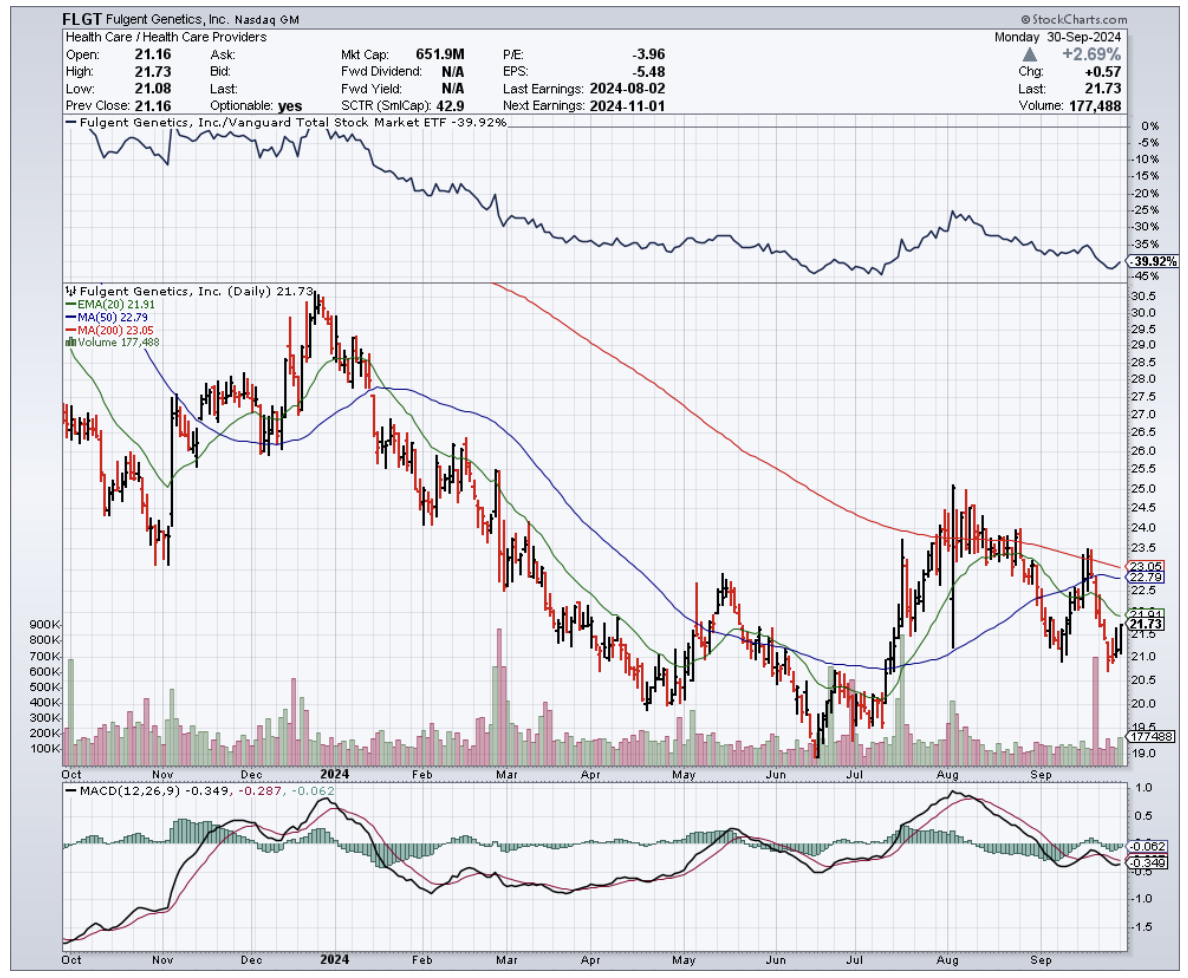If you blinked, you might have missed the meteoric rise of Fulgent Genetics (FLGT) during the pandemic.
What started as a small player in genetic testing suddenly became a heavyweight in COVID-19 diagnostics, raking in nearly a billion dollars in revenue.
But with the pandemic in the rearview mirror, investors are wondering if Fulgent is just another one-hit wonder—or if it has a real shot at a biotech encore.
Fulgent started life in 2011 as a tech-savvy genetic testing outfit. They'd take your DNA, run it through their whiz-bang machines, and spit out a report for your doctor.
Not a bad gig in a market that's set to grow at 22% annually for the next decade.
But then 2020 rolled around, and boy did the plot thicken. COVID-19 hit, and Fulgent went from 59,000 billable tests in 2019 to a mind-boggling 10 million in 2021.
Talk about being in the right place at the right time.
Their COVID performance sent Fulgent's revenue into the stratosphere, rocketing from $32.5 million in 2019 to $992.6 million in 2021.
But as we all know, what goes up must come down, and by 2023, revenue had fallen back to $289.2 million as the COVID testing frenzy fizzled out.
So, where did Fulgent go from here? That’s the billion-dollar question—literally.
With COVID-19 testing revenues all but evaporated (just $841,000 in Q2 2024, or 1% of total revenue), Fulgent is back to focusing on its core genetic testing business and mapping out new territory.
Fortunately, the company didn’t just sit on its COVID cash pile. Instead, it made several strategic acquisitions to shore up its position in the broader healthcare space.
In 2021, Fulgent bought Cytometry Specialists Inc. (CSI), a move that expanded its presence in molecular diagnostics and cancer testing.
Then, in 2022, Fulgent went on a shopping spree, picking up Inform Diagnostics—a major pathology lab—and Fulgent Pharma, which marked its entry into the therapeutic development game.
These moves signal a clear intent: Fulgent wants to transition from being a niche diagnostics firm to a full-fledged healthcare solutions provider.
And here’s where it gets more interesting. Fulgent Pharma brought along a pipeline of drug candidates, including FID-007, a novel treatment for head and neck cancer that uses advanced nano-drug delivery technology.
While this segment currently contributes zero to the top line, the upside potential is massive if any of these candidates clear FDA hurdles.
Next, let’s take a look at the numbers.
Pre-COVID, Fulgent was growing at a respectable 21% clip from 2016 to 2019, but profitability was as elusive as a straight answer from the Fed. The pandemic changed all that, flooding the company with more cash than a Vegas high roller.
Still, even as COVID revenues dried up, Fulgent's core business kept growing. Their non-COVID revenues have jumped from $32.5 million pre-pandemic to $262 million in 2023.
That's an 8-fold increase, folks. Not too shabby for a Plan B.
As of Q2 2024, Fulgent's sitting on an $838 million cash pile, with zero debt. That's a lot of dry powder for a company valued at around $700 million.
Now, valuing Fulgent is trickier than nailing jello to a wall. Its specialized industry and lack of sustained profitability in its core business make traditional metrics about as useful as a screen door on a submarine.
But if we include long-term marketable securities in our net current asset value (NCAV) calculation, we get a per-share value of $25.40.
With the stock trading at $22.70, that's a price-to-NCAV ratio of 0.89x. Historically, Fulgent has traded at much higher multiples. Smells like opportunity to me.
And remember, this valuation gives zero credit to Fulgent's operating business. If they can hit their target of 40% gross margins by year-end 2024, we could be looking at a serious re-rating of this stock.
Of course, no investment is without risk, and Fulgent's got its share.
The main worry is cash burn, especially as they venture into the cash-hungry world of drug development. For 2024, they're expecting to burn $15-17 million on therapeutics development. That's manageable for now, but it's something to keep an eye on.
There's also the risk of bad acquisitions. Fulgent's been on a buying spree, and while it's paid off so far, one bad deal could spoil the broth.
Lastly, there's the Ming Hsieh factor. The CEO owns 29% of the company, giving him more control than a puppet master. His vision sounds promising, but it's speculative and may not always align with shareholder interests.
So, what’s the bottom line here?
Fulgent Genetics is like a biotech chameleon, constantly adapting to its environment. It rode the COVID wave to financial success and is now trying to parlay that into a long-term winning strategy. I suggest you buy the dip.

